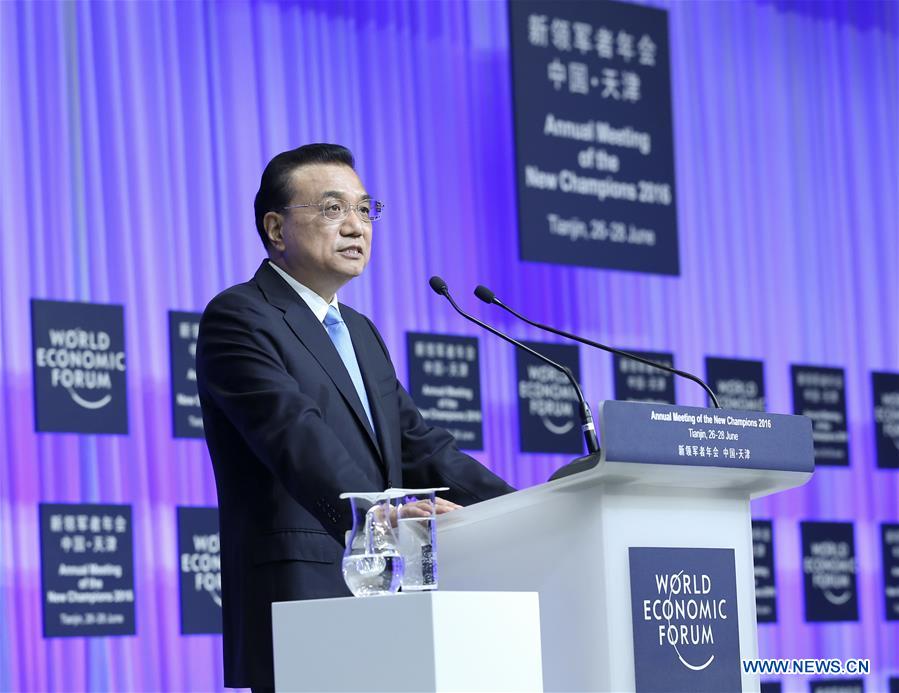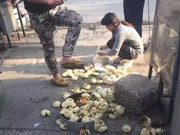


Chinese Premier Li Keqiang addresses the opening ceremony of the Annual Meeting of the New Champions 2016, or Summer Davos Forum, in Tianjin, north China, June 27, 2016. (Xinhua/Pang Xinglei)
This year's Summer Davos Forum is underway in Tianjin, with Chinese Premier Li Keqiang giving an address to the economic forum's opening ceremony, providing his take on stabilizing the world economy and how the Brexit may impact China.
Speaking on Monday in Tianjin, Li Keqiang says structural reform is urgently needed to develop a balanced world economy.
"To push forward a stable world economic rejuvenation, we need to initiate structural reforms. Though each country has its own particular needs, the general direction should be to deal with economic imbalances by bringing in financial reforms, deregulation, encouraging competition, supporting innovation, opening-up further and working together to promote a strong, sustainable and balanced growth model for the world economy."
The Summer Davos, officially known as the Annual Meeting of the New Champions, was established in 2007 by the World Economic Forum, a Swiss non-profit.
Since then, the summer forum has been promoting exchanges and cooperation between China and the rest of the world.
Li Keqiang says restructuring the global economy needs policy support from governments around the world.
"To rejuvinate a stable world economic situation, we're going to speed up the upgrading and restructuring of the global economy. Each player should make the best use of its current circumstances, and direct its policy focal points into the economic restructuring and upgrades to enhance the new power of economic development."
Specifically, Li Keqiang says the Chinese government will continue to promote mass entrepreneurship and "the Internet Plus" initiative to foster new growth.
He also has used the speech to insist that the Chinese economy will not suffer a hard landing, noting China's GDP growth through the first quarter came in at 6.7-percent.
Li Keqiang says when global economic times are difficult, the world needs to rally together.
"To advance world economic stability and rejuvenation, we need efficient and orderly global governance. When facing common challenges, it is important to stay together, help each other, and benefit from each other as well."
Noting the vote by Britain to leave the European Union, Li Keqiang says the move should not take away from every country working to maintain global economic growth and other issues.
The Premier says China remains committed to both Britain and the EU.
"Europe is an important cooperative partner of China, and China will continue to maintain and develop China-Europe and China-Britain relations. We hope to see a united and stable European Union, and also a stable and prosperous Britain."
This year's Summer Davos will host more than 200 seminars.
Around 17-hundred political, business and academic figures are representing 90 different countries and 17 regions.
Topics at these meetings will include the "fourth industrial revolution," which is the theme of this year's Summer Davos, and refers to the integration of data technology and manufacturing.
The Chinese economic new normal and supply side reforms are also high on the agenda.
The Summer Davos is held annually in China, alternating between Tianjin and the northeastern city of Dalian.
It has brought together participants from numerous emerging countries, including India, Russia, Mexico, and Brazil, as well as from a host of developed countries.
This year's forum runs through Tuesday.
Day|Week

 China's first intelligent security robot debuts in Chongqing
China's first intelligent security robot debuts in Chongqing A Total of 3,552 Subscribers Vanish In Two Days; YouTube Closes All Doors to Users’ Inquiries
A Total of 3,552 Subscribers Vanish In Two Days; YouTube Closes All Doors to Users’ Inquiries Out of this world! Futuristic UFO-shaped yacht has its own garden and a stunning underwater viewing deck
Out of this world! Futuristic UFO-shaped yacht has its own garden and a stunning underwater viewing deck An old tea house in Chengdu
An old tea house in Chengdu Furious Customer Crushes All the Buns from Vendor Just Because He Was Given the Wrong Flavor
Furious Customer Crushes All the Buns from Vendor Just Because He Was Given the Wrong Flavor 20 post-90s couples hold ’naked marriage‘ in E. China
20 post-90s couples hold ’naked marriage‘ in E. China Female official wearing traditional Han costume to promote local tourism
Female official wearing traditional Han costume to promote local tourism Over 12,000 Runners Seek Medical Care in S China’s Marathon
Over 12,000 Runners Seek Medical Care in S China’s Marathon Six Luxury Sports Cars Totaled after Fail Attempts to Cross China’s Most Perilous Highway Linking SW China’s Sichuan and Tibet
Six Luxury Sports Cars Totaled after Fail Attempts to Cross China’s Most Perilous Highway Linking SW China’s Sichuan and Tibet Incredible Transformation: “Witch Child”Whose Parents Left Him for Dead in Nigerian Makes Speedy Recovery
Incredible Transformation: “Witch Child”Whose Parents Left Him for Dead in Nigerian Makes Speedy Recovery